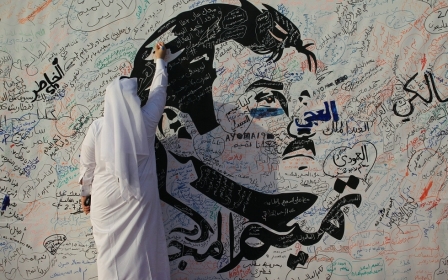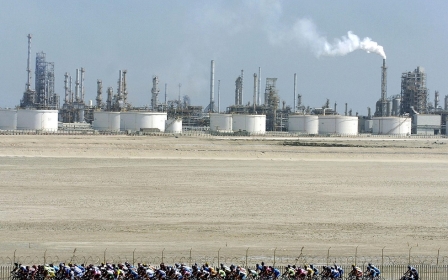Qatari foreign minister: Saudi-led siege 'a clear insult and aggression'
Qatar's foreign minister has called the Saudi-led blockade of his country a "clear aggression and an insult" and urged its opponents to act with reason and through dialogue to solve problems in the Middle East.
Mohammed bin Abdulrahman al-Thani told an audience in London that attempts to silence Qatar's independence would only exacerbate the "serious problems" experienced in the region and accused Saudi Arabia and its regional allies of "demanding that we must surrender our sovereignty as the price for ending the siege".
His speech at the Chatham House think tank comes as the foreign ministers of Saudi Arabia, Egypt, the United Arab Emirates and Bahrain met in Cairo to consider its response to Qatar's refusal to give in to 13 demands, including ending alleged support for "terrorists" and shutting down media organisations.
Qatar continues to call for dialogue. We welcome any serious efforts to resolve our differences with our neighbours
- Qatar's foreign minister
Qatar's foreign minister said that Saudi Arabia and the United Arab Emirates were the main drivers of a campaign to isolate it, but added that Qatar was unlikely to be thrown out of the Gulf-Cooperation Council (GCC) regional group.
"We believe that this entire campaign is merely driven by Saudi Arabia and the United Arab Emirates and these are the countries that we need to engage to find out what are the real problems and what are the real grievances," he said.
Bin Abdulrahman also used the London event to call for "dialogue" and to openly welcome any serious effort to solve the crisis with its Arab neighbours through dialogue "not blockade".
He said: "Qatar continues to call for dialogue. We welcome any serious efforts to resolve our differences with our neighbours," he said, adding: "We don't accept intervention in our own affairs".
But he said Qatar would not take the first step, and declined to disclose the details of a response that Qatar has given to the Arab states' demands. "They should not expect from me a first step, I should expect from them a first step for engagement," he said.
Earlier on Wednesday, the Saudi foreign ministry said it had received Qatar's response to their demands - which include Doha ending support for the Muslim Brotherhood and closing broadcaster Al Jazeera - and would respond "at the right time".
Saudi Arabia and its allies have not said what steps they could take next, but there are fears of a wider embargo that would hurt the Qatari economy, with ratings agency Moody's announcing it was changing Qatar's outlook to negative over the crisis.
A group of Arab states led by Saudi Arabia has severed air, sea and ground links with Qatar, cutting off vital routes for imports including food.
They also ordered Qatari citizens to leave their territories and took various steps against Qatari firms and financial institutions.
The Qatari foreign minister told the London event that the underlying cause of the conflict was Qatar's "different views" on wider issues in the Middle East amid concerns over extremism. "Why is Qatar's independence a threat to blockading countries? Because we have different views," he said.
The foreign minister said the "crux" of the issue was differences in approach from the Saudi bloc and Qatar. He said: "Here is the crux: we have seen how young people left without hope turn to violence. We have watched as the world blames Islam. "As the emir has said, the cause is not Islam. It is hopelessness. There are serious problems in the Middle East. Silencing Qatar will not stop them."
The crisis has raised concerns of growing instability in the region, home to some of the world's largest energy exporters and key Western allies who host US and UK military bases.
Energy-rich Qatar has been defiant throughout the crisis, insisting it can weather action taken against it.
However, the Qatari minister suggested he saw little hope of a rapid reconciliation and that his country was preparing for a more protracted rift.
"What we've done in the last few weee foks is develop different alternativr ways to ensure the supply chain for the country not to be cut off."
He looked ahead to the football world cup that Qatar does not host until 2022
"Even if the blockade is lifted, we have to rely on ourselves and ensure we deliver a World Cup that is attractive to the world," he said.
Responding to the accusation that it was now too close to regional rival Iran, he said Doha had to live alongside Tehran since the two states shared a gas field.
In a question and answer session at the Chatham House event the Qatari foreign minister denied Saudi and UAE claims that the country had paid ransom money to a Shia group to free kidnapped hunters in Iraq.
Bin Abdulrahman said the payment was made to the Iraqi government, and not Iran-backed militants.
Middle East Eye propose une couverture et une analyse indépendantes et incomparables du Moyen-Orient, de l’Afrique du Nord et d’autres régions du monde. Pour en savoir plus sur la reprise de ce contenu et les frais qui s’appliquent, veuillez remplir ce formulaire [en anglais]. Pour en savoir plus sur MEE, cliquez ici [en anglais].





